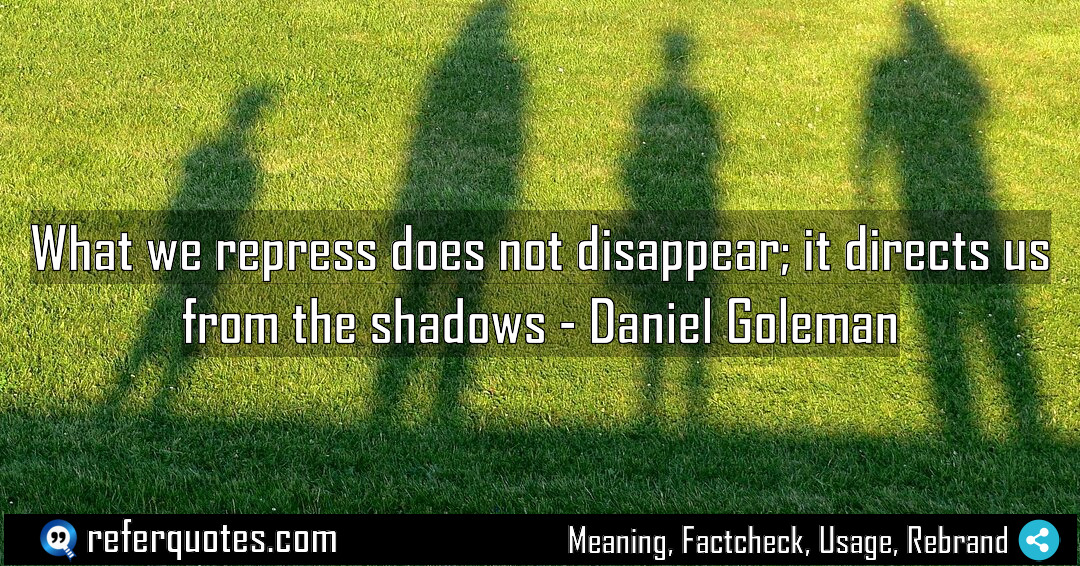You know, that idea that “What we repress does not disappear” is so true. It’s like trying to hide a beach ball underwater—it always pops back up, just in a different, often messier, spot. It’s a fundamental rule of the human psyche.
Share Image Quote:Table of Contents
Meaning
At its core, this quote means that our buried emotions and uncomfortable truths don’t just vanish. Instead, they go underground and continue to exert a powerful, often hidden, influence on our thoughts, feelings, and behaviors.
Explanation
Look, I’ve seen this play out countless times. When we push down a painful memory, a shameful impulse, or a “weak” emotion like fear or sadness, we’re not deleting it. We’re just refusing to look at it. And that’s the problem. That repressed material doesn’t just sit quietly in a basement corner of your mind. It starts calling the shots from the shadows. It leaks out as unexplained anxiety, as a sudden outburst of anger that feels disproportionate to the situation, or as a self-sabotaging pattern you just can’t seem to break. It’s the reason you might feel an irrational aversion to something or someone that reminds you, on a subconscious level, of that repressed pain. The energy it takes to keep it buried is immense, and it subtly directs your entire life. It’s like having a hidden program running in the background of your mental computer, draining your battery and affecting your performance without you ever seeing the code.
Quote Summary
| Context | Attributes |
|---|---|
| Original Language | English (3668) |
| Category | Emotion (177) |
| Topics | truth (77) |
| Literary Style | poetic (635) |
| Emotion / Mood | introspective (55), mysterious (1) |
| Overall Quote Score | 89 (88) |
Origin & Factcheck
This insight comes straight from Daniel Goleman’s 1985 book, Vital Lies, Simple Truths: The Psychology of Self-Deception, published in the United States. While the concept is deeply rooted in Freudian psychoanalysis, this specific, elegant phrasing is Goleman’s. You sometimes see similar ideas floating around unattributed, but this is the definitive source.
Attribution Summary
| Context | Attributes |
|---|---|
| Author | Daniel Goleman (125) |
| Source Type | Book (4032) |
| Source/Book Name | Vital Lies, Simple Truths: The Psychology of Self-Deception (61) |
| Origin Timeperiod | Modern (530) |
| Original Language | English (3668) |
| Authenticity | Verified (4032) |
Author Bio
Daniel Goleman is a psychologist and bestselling author whose journalism at The New York Times brought brain and behavior science to a wide audience. He earned a BA from Amherst and a PhD in psychology from Harvard, and studied in India on a Harvard fellowship. Goleman’s research and writing helped mainstream emotional intelligence, leadership competencies, attention, and contemplative science. He co-founded CASEL and a leading research consortium on EI at work. The Daniel Goleman book list includes Emotional Intelligence, Working with Emotional Intelligence, Primal Leadership, Social Intelligence, Focus, and Altered Traits.
| Official Website
Where is this quotation located?
| Quotation | What we repress does not disappear; it directs us from the shadows |
| Book Details | Publication Year: 1985; ISBN: 9780743240156; Last edition: 1996 Harper Perennial; Number of pages: 288. |
| Where is it? | Approximate page from 1996 edition, Chapter 6: The Adaptive Mind |
